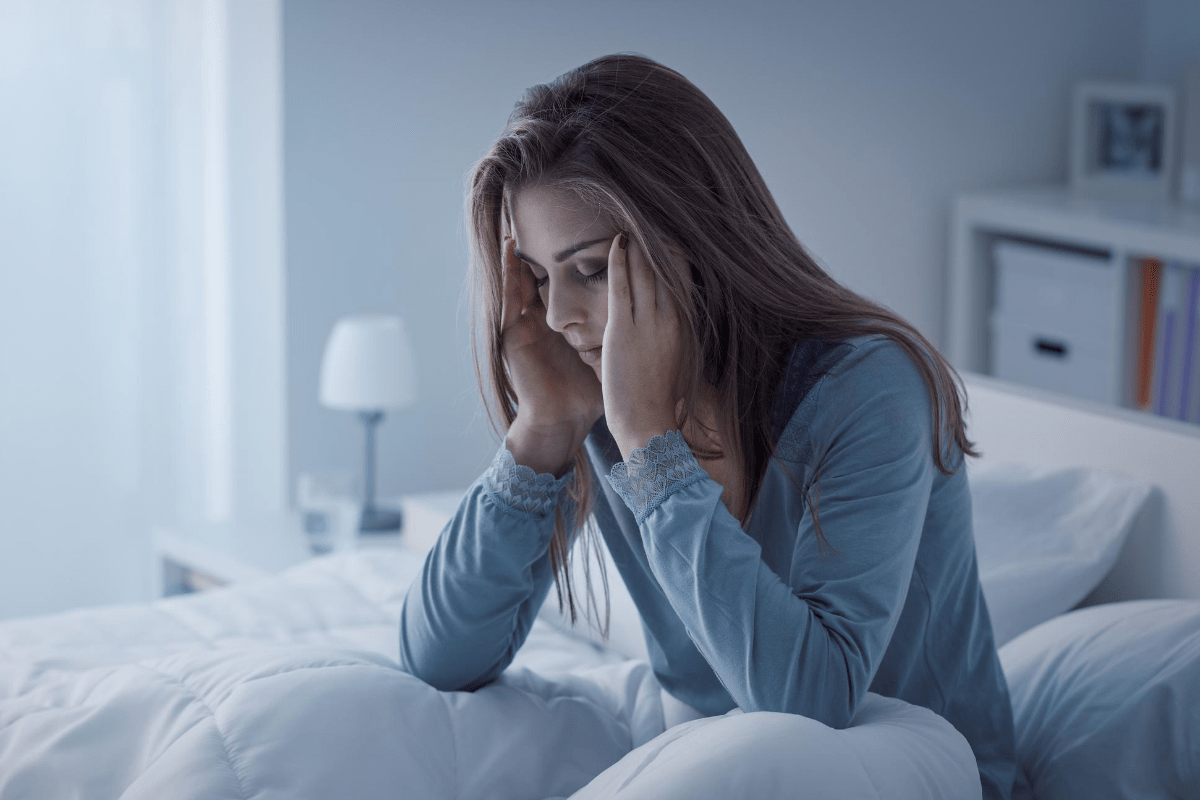Tossing and turning in bed, propping up to check the clock for what time it is, staring out of the windows or grumbling inside the covers – these are not threads from a dystopian story but the midnight realities of the lion’s share of our species today, young and old. Sleeplessness pervades irrespective of age, gender or any other factors that would probably be criteria enough for any ordinary illness. This rampancy, along with the dire effects it can have on its prey forced the government of the United States to call Sleeplessness an epidemic in the second quarter of 2020.
A healthy sleeper with ample bouts of sleep daily or an insomniac with erratic sleep patterns, if you choose to second the notion that ‘time is money’ then you would also find yourself agreeing that ‘sleep is medicine.’ Hence, at a point in time’s cycle where nights have become nightmares to people for whom sleep is a distant dream, it is essential to understand the inverse relationship between stress and sleep and ways to get to the pillow without a pill.

Stress and anxiety can be the main villains in the sleep story of the majority of insomniacs. They share an inverse yet mutually developing relationship, as stress leads to lack of sleep and vice versa. It not only plays with your hormones and makes you stay awake at night, but also makes you emotionally reactive and physically inactive. Fatigue, indigestion and mood changes are few of the most common aftereffects of stress based insomnia. These physical and mental effects range from mild reactions to psychosomatic disorders.
However, stress can affect the sleeping habits of different people in different ways, as ‘resilience’ varies from person to person. Resilience is a person’s ability to withstand stress and anxiety. While some people have the potential to resist or overcome the strain, some are vulnerable to the same. The latter might be subject to a higher risk of these consequences. Moreover, the causes of stress or anxiety can be instrumental in stealing your sleep. The youth of today being in a ‘fast and furious race,’ it is high time we realise that ‘slow and steady win the race.’ There are multiple sources of stress for the millennium kids, as is common lingo. This pressure exists from home to highway.
Stress from the family is something that bugs youngsters even before they reach their youth. There are bars set, and certain expectations are meant to be fulfilled. The child is forced to rise to the expectations and meet it, sometimes directly or otherwise indirectly. Although this might seem to be a macro-level problem, its consequences seep down to the micro-level and affect sleep patterns as well. Children who receive slack from their parents or relatives tend to have lower self-esteem and will be in a constant rabbit race to level up. This puts them on a twenty-four bar seven alert to become better and do what they think might impress the elders who expect. As a result of this preoccupation, it’ll be challenging to declutter the mind from experiences of that day or things they failed to do, making it difficult to sleep.

Social and emotional factors cause stress too. Although it might mislead you to think that it is something that the society demands of a person, similar to the streaks of family induced stress, that is not all. It is that which makes a person feel that they are inept of social skills and that they need to fare better to be accepted in society. This might be due to an inherent lack of social skills or difficulty to socialise. The feeling of not being enough or fear of being dysfunctional in a highly vocal, busy social setup can push a person into anxiety, particularly social anxiety. Conscious efforts towards becoming an acceptable social being could put a person in a loop of worry and woe. This interferes with a calm mind and disables any attempt to sleep peacefully. Along with this, emotionally challenging experiences such as the loss of a loved one, a relationship issue, taking care of a sick person, a traumatic event or sudden changes in circumstances could be causes of excessive stress and anxiety.
Educational or job stress is one of the most common types of stress associated with lack of sleep or sleep deprivation. With the world becoming competitive day after day, there is a continuous performance pressure on the youngsters. It has made a tension-free, simple life almost nonexistent. All the hustle and bustle of the modern world are physically taxing. On top of that, deadlines and targets make it mentally cumbersome. This mechanical, monotonous cycle takes a toll on the sleep patterns and makes a person restless when it is time to rest. Thoughts of things to do, setbacks faced, goals to be achieved etc. keep bugging the mind constantly, forcing the body to be on an alert mode and attend to it irrespective of the time or being on the bed. Unlike before, there are more desk jobs in the market than those demanding physical labour. The resultant increase in screen time and exposure to electronic gadgets throughout the day can be hugely impactful in determining the quality of sleep.
SUTRAS FOR SOUND SLEEP

Music as a pill-ow
Music is known to have healing capacities. Listening to a slow melody or soothing number can help in reducing stress and anxiety, and eventually lull you to sleep. It stimulates your body to produce Endorphin, a happy hormone that helps in relaxing and reducing stress, changing panic to positivity. Although it might be difficult to accept in the onset, it is true that something as simple as few words hummed in tune can have a direct impact on your body – energise parasympathetic nervous system, slow down the heart rate and breathing, lower blood pressure, and trigger muscles to relax.
Food as fuel
Food is often considered as a fuel for everyday physical activities. In the same manner, healthy diet habits can fuel sound sleep as well. It is a key ingredient in developing healthy sleep patterns. Hogging in heavy food in copious amounts before bedtime can prove to be bad for good sleep. The same goes with highly oily food and diets involving meat. It is always advisable not to go to bed soon after dinner, but to consume the last meal of the day at least an hour before sleep.
Entertainment away
Screen time stops the production of the hormone Melatonin that dopes the body into thinking that its daytime. Blue light, as it is called, emitted from gadgets such as mobile phones or laptops, makes the body alert and urges it to stay awake and active. Increased use of electronic items late into the night can result in lowering chances to sleep, as the release of Melatonin (which is at its best in darkness) is limited. It is often recommended to shut down all devices one to two hours before bedtime.
Exercise is escape
Exercise can be a game-changer in sleep deprivation and associated problems. Its benefits are twofold – mental and physical. Physically it helps in burning extra fat and easing up the muscles, resulting in a more relaxed body. Mentally, just as music does, it stimulates the body into releasing happy hormones like Endorphin, which gives a feeling of positivity. Those exercises like Yoga help in transitioning from a stressed-out mind to a calm and peaceful one through meditation.

The bedroom is for the bed
Preserving the bedroom as the bed-room might turn out to be a magic mantra for good sleep. Instead of using your bedroom as a workspace or mini theatre, getting accustomed to using it as a sole source of relaxation will help the body be oriented towards sleep when in the bedroom. Using dark curtains, maintaining quietness, and warm or cold temperature as per convenience are some ways of giving the bedroom a sleep-worthy atmosphere. Added luxury such as eye masks can be beneficial too.
Read off to Sleepdom
Reading has proved to be one of the critical stimulants of sleep. Well, you could read between that line with a tinge of sarcasm as well. Bedtime reading sessions by parents or story narrations grandmas are famous for are clear examples of how effective tickling the imagination could help in triggering sleep. Mostly considered as a pass time or leisure activity, reading a book manipulates the body into thinking that it is a time for rest and relaxation, consequently signalling it to sleep.
Routine is key
It is a popularly known theory that any activity done continuously for twenty-one days eventually becomes a habit. Based on the same principle, developing a sleep routine for every night, and the following morning is a highly effective idea to get closer to your healthy sleep goals. Setting a time to switch your body off and switch the alarm on every night will involuntarily force you to go to bed after the first few nights which might demand voluntary efforts. The ‘Early to bed, early to rise’ strategy could be instrumental in defining your daily sleep.
Doctor to the rescue
If in case any or none of these tips are proving to be beneficial in getting your sleep straight and smooth, remember, there is always a doctor a few blocks away. Depending on the severity or intensity of insomnia and based on the influencing factors such as stress, anxiety or other mental health issues, medical assistance might be required. Consulting a Somnologist and getting a Somnography or Polysomnography done could turn out to be the best remedy for your malady.
The assignment might require you to spend two more hours in front of the laptop, and the school won’t stop exams, your boss might not stop screaming, you might not become an extrovert overnight, your family will never stop expecting from you, your relationship could or could not be mended. The stress factors could get worse or sometimes, remain unchanged. Come what may, a decent sleep could make you feel better because the coping mechanisms available outweigh the causes – there’s always room for an extra pillow and an extra hour of deep sleep!





